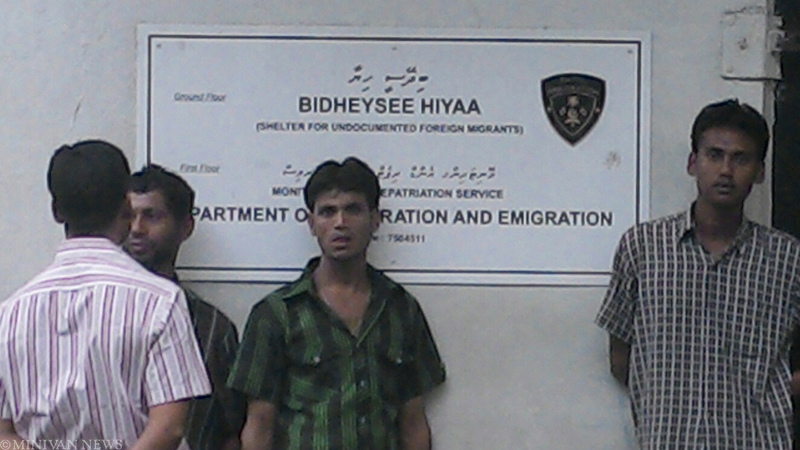The Department of Immigration and Emigration today warned migrant workers against participating in protests and threatened to cancel work visas for protesting expatriates.
The warning came after local media today announced migrant workers had called for a mass protest on Friday against entrenched discrimination and a recent spike in violence which saw two Bangladeshi nationals murdered and three stabbed in Malé.
A 25-year old Bangladeshi, Shaheen Mia, was stabbed to death in a Malé café in the early hours of the morning on Sunday (March 22), while a Bangladeshi national identified as Bilal was found dead in Alif Alif Atoll Thoddoo Island on Monday night.
Meanwhile, three expatriate workers were stabbed on Tuesday between 7:20pm and 7:40pm in three different locations in Malé.
But the Controller of Immigration and Emigration Mohamed Anwar in a statement today said expatriates protesting for their rights was against the terms of their work permits, and threatened to cancel visas without a second warning.
If action was taken against an expatriate worker for protesting, Anwar said the Immigration Department would also suspend services to their employers.
He called on employers to remind migrant workers to respect Maldivian laws and stay away from protests.
“The immigration department will not hesitate in penalising those who participate in protests,” he added.
The Human Rights Commission of the Maldives’ (HRCM) Vice President Ahmed Tholal said the ban on migrant worker protests was unconstitutional.
“The constitution guarantees every person on Maldivian soil the right to protest. A clause in a migrant worker’s contract cannot override the constitution,” he told Minivan News.
Expressing grave concern, Tholal said the recent fatal attacks amount to hate crimes as the violence appears to be targeted against migrant workers.
He noted discrimination and inhumane treatment of migrant workers were entrenched issues in the Maldives, and said this week’s violence further marginalised an already vulnerable group.
Tholal called on the Maldives to immediately initiate discussions with diplomatic missions and take urgent action to ensure the safety of migrant workers.
According to the 2014 national census, there are 58,683 migrant workers in the Maldives. However, the department of national planning said the figure was much lower than the official figure recorded by the Immigration Department.
The US State Department in its 2014 Trafficking in Persons report described the Maldives as a “destination country for men, women, and children subjected to forced labor and sex trafficking.”
Migrant workers – primarily Bangladeshi and Indian men in the construction and service sectors – experienced forced labor, including fraudulent recruitment, confiscation of identity and travel documents, withholding and nonpayment of wages, and debt bondage, the report said.
The State Department welcomed the Maldives passing its first anti-trafficking law in 2013, but decried “serious problems in anti-trafficking law enforcement and victim protection.”
“The government did not adequately train police and other officials on trafficking, nor did it provide authorities with procedures to identify victims among vulnerable populations and refer those victims to protective services. Consequently, the government penalised some victims for offences committed as a result of being trafficked and also deported thousands of migrants without adequately screening for indications of forced labor,” the report said.
Following the enactment of the Anti-Human Trafficking Act in 2013, the Maldives avoided relegation to Tier 3 and possible international sanctions.
Human rights group Transparency Maldives (TM) has also described the Immigration Department’s protest ban as unconstitutional and called on the government to listen to worker’s concerns.
TM also urged law enforcement agencies to expedite investigations into migrant worker murders and called on the government to sign the International Covenant on Migrant Workers immediately.
Likes (3)Dislikes
(3)Dislikes (0)
(0) 
